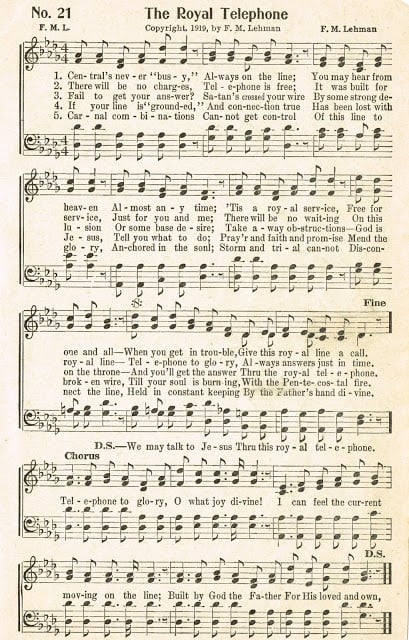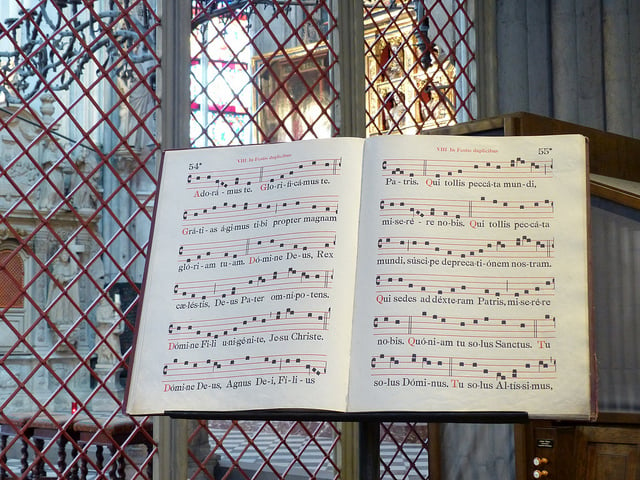An Inaudible Introit
Churches don’t sing anymore.
We know, already! For the love…
A quick trip down Google’s memory lane reveals that the internet has been talking about this regularly since at least 2012.
And everyone seems to know why.
Because nobody knows the songs.
Because it makes men uncomfortable.
Because it’s just a performance.
Because we don’t love Jesus enough.
There is truth to some of these points, none to others, but most of them miss the foundational problem.
There is one basic, fundamental reason that congregations no longer sing.
Nobody sings anymore.
A Closemouthed Call to Worship
Okay, so there are folks that sing here and there. But by and large, we are no longer a culture of music-makers. Nope, instead of making music, we consume music. We might croon along with our favorite jams, but we don’t really, make the music ourselves anymore. While appreciating music once meant developing the ability to “do” music, it now means that we obsessively listen to recorded music, possibly of a few various popular genres.
We listen to a semi-musical product, but most of us don’t ever do any real music-making, except for attempts to reproduce what we hear on our favorite recordings.
My friend Richard, a professional musician and Ponder Anew reader, recently told me this:
Born in 1951, we had songbooks along with reading, arithmetic, and spelling books. We were singing Stephen Foster’s “Nelly Bly” in second grade. Our fourth grade teacher handed out small booklets and we learned “Love Lifted Me.” The 5th/6th grade elementary chorus in our very rural school district sang the Mozart “Alleluia.” Men’s clubs like Rotary had songbooks and songleaders and sang at every meeting. Hymns were a part of Sunday School as well as church. We sang at summer camp—not just church camp, but Scout camp as well. Things have changed!!! I suspect singing is no longer heard in many of those venues.
I suspect it isn’t, and if it is, it’s probably poor imitations of popular music, which suffice it to say, isn’t a genre brimming with natural vocal expression.
Now, more than ever, people just claim that they can’t sing at all.
Any music teacher realizes, of course, that this is pure crap. Anyone with a functioning voice can learn to sing. Some will sing better than others, but anyone can learn to sing. In my previous career teaching K-4 students in a public school, I taught over a thousand kids, and I never had a student with a mustard seed of willingness that I couldn’t teach to sing pleasantly and on pitch. But if they grow up never hearing anyone actually sing live, if no one in their family can sing apart from a recording, if they don’t have an encounter with singing in school or church, they won’t know this. We can do better.
It royally hacks me off when I hear a pastor or so-called “worship leader” say things like, “Some of us can sing, and others of us just make a joyful noise” or “Even if you can’t carry a tune in a bucket, just do your best.” I’ve heard this nonsense in most churches I’ve belonged to, and I get that its intended as encouragement, but it doesn’t work. If you’ve never been even informally taught to sing, you’re likely going to believe you’re one of those tone-deaf folks. And are you going to try? Not likely. And you’re certainly never going to come away with the idea that your singing is of any value in corporate worship.
Instead, churches must begin assuming that everyone CAN sing, teaching them they can sing, and setting good examples of singing. Only then will we begin to change our mute Christian culture.
A Sonorous Sermon
This is NOT, however, the last post you will ever need to read on how to get churches to sing once again. We desperately need ongoing, long-term conversations on this. I’ve written more in-depth on this subject in a previous post, but here is a brief summary of steps that should be taken in every congregation.
Do music that is meant to be sung, and in a way that encourages healthy, hearty singing. Most of the music churches are now attempting to sing is instrumentally-driven music in a vernacular style that was written for a solo artist recording. Replicating that style of music, with its syncopation, affected vocals, aimless melodies, and awkward vocal ranges, is impossible congregational task. There are new songs and hymns being written that are excellent for a congregation, but you won’t usually hear them on Christian radio.
Stop the Hillsongization of congregational singing. (Thanks to Michael Raiter for the pertinent description.) Along those lines, musical leadership in most contemporary settings is basically a cover band making an attempt to recreate a commercial “worship” recording. The quality, therefore, of each congregation’s “worship” is directly determined by how good their cover band is. We’ve probably heard this story from family, friends, or former congregants: “I used to go to this church, but my family really enjoys the powerful worship over at this other church.” From what I’ve seen and heard, they usually mean, even if they don’t realize it: “The cover band at my new church is better than the cover band at my old church.” We’re left with churches that pretty much all want to sound the same singing mostly the same songs. And cover bands are not usually very adept at drawing the song out of a congregation.
You know, there used to be these big instruments. Most churches had one, you know, back when churches sang. They had all these different sounds and seemingly limitless combinations. They could really sustain and enhance congregational singing. Forget what they were called…
I’ve even heard this sad story from my friends in the a cappella tradition. I don’t necessarily agree with their theological basis for not using instruments, but the effects are wonderful. Generations have grown up learning to sing, and learning to sing well, read music, and worship in song with confident singing and rich harmonies that is entirely vocally led. But even these denominations and groups are debating whether to bring instruments into their singing, you know, guitars, percussion, that sort of thing. Unfortunately, if they keep it up, they’ll eventually find themselves like everyone else, with their cover band in front of a tentative, muted congregation.
Recognize that singing is, in and of itself, a sacred duty. Singing is important. Not just hearing the music playing, not just being taken emotionally to a place where we enjoy cuddle time with a comfy Creator God, but the actual act of singing. Most of us believe and our churches confirm the ridiculous notion that worship is the musical part of the service. And since most of us aren’t singing with any intentionality or seriousness, the really worshipful part is letting the music that other people are do create these happy, positive, weighty, Jesusy feelings inside of us. Yes, we’ve decided that music’s job in worship is to lead us into the presence of God.
But there are some things that music just can’t do. This is one of them. For all of its strengths, music has no sacramental power.
If we want our churches to keep singing, and for that matter, to keep worshiping through song, we’ve got to put this idea to rest.
A Robust Recessional
When it’s time to sing, sing. Just sing.
Sing your faith.
Sing your theology.
Sing to help proclamation take hold in your hearts and minds.
Sing, even when you don’t feel like it.
Sing, even when you don’t mean it.
Sing when you don’t like the song.
Sing when the words are more convicting than uplifting.
Sing with no expectations of being carried away into an affective experience.
Sing, and teach your congregations to sing with you, especially your children.
We may not be able to turn the tide in the rest of our culture, but with intentionality over the next generations, we can change the culture of singing in the church. This is not a non-essential of faith. This is not adiaphora. This is important stuff. If the ancient principal of lex orandi, lex credendi is true, if how we believe is determined by how we worship, then we must learn to sing well, just as we must learn to preach well and to pray well.
If we don’t, we may just stop singing altogether. And we’ll be all the poorer for it.
For further reading, click on one of the images below.

















